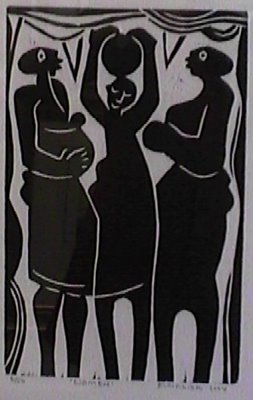They Wear it Like a Badge of Honor
This past Sunday we shared a moment, Awa and I.
We weren’t looking each other in the eye when this happened. It was a collective ‘then why!’ that we screamed out at the exact same moment that we shared.
While she corn rowed my hair we watched an African movie. The movie was about a brothel and the African equivalent to Heidi Fleiss who had the police down on lock. One of the clients was a rich man who refused to give his young daughter money for her school fees. She was on the verge of being kicked out of school for non-payment. Of course the movie had much drama besides the brothel but Awa and I’s moment came when this father asks ‘the madam’ for a young fresh girl and it just so happens that the young daughter is finally fed up of her father’s antics and decides she needs to make the money herself and the ‘madam’ is money hungry and happy to receive a new client that fits the bill. Cut to the hotel room where sugar daddy is in the bathroom when the girl enters the room. The look of horror on both the father and daughter’s faces as they realize what has happened garnered the collective ‘why’ from Awa and I.
My experience growing up was that Zambian men wore infidelity like a badge of honor. And women simply looked the other way. I could only speak for Zambian men that I saw but now that I am older I know that this is a common theme in Africa. Awa is from Mali. I’m by no means saying infidelity is reserved for the African continent. I am simply stating that in Africa infidelity isn’t done in the dark with elaborate schemes for wives to never find out. Husbands simply don’t come home with no good excuse or proudly bring their children born out of wedlock into their homes for the ‘main wife’ to see and in some cases raise. Women in America may suspect something and do some investigations or end up on an episode of Cheaters ready to box. Of course there are women here who turn the other way too.
Another thing this movie brought up for me was the power of sexuality and the lure of easy money. A common theme here in America is that young boys are usually lost to the streets because of the promise of ‘family’ from gangs and the lure of easy money. Making a $1000 a day out hustling is such an easy option for someone who sees their mother and other relatives ‘slaving’ for $250 a week. It is the same in Africa for young girls. Having a sugar daddy ready to pay you for simply spreading your legs is such an easy option and so many young girls fall prey.
This little silly movie reminded Awa and I of the crazy childhoods we witnessed. It is a wonder we aren’t out here doing what we saw growing up. Maybe it is because we related to our Mothers and saw their pain daily and vowed to NEVER be treated in such a way by our mates. We daughters of Africa are in constant conflict because we love our fathers and think the world of them but we find it hard to understand why they put us through this kind of pain with their infidelity.
So the question remains, why Daddy, why? One day I’ll have enough courage to ask.


